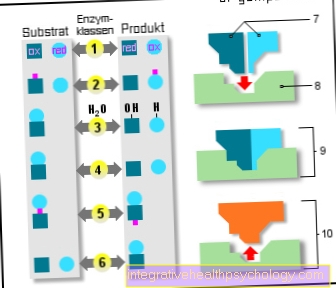Authoritative upbringing
definition
Authoritative upbringing is a style of upbringing that represents a kind of golden mean between authoritarian and permissive upbringing. Authoritarian upbringing is characterized by a clear hierarchy in which the parents have the say and work with the reward and punishment system. Parents who raise their children in a permissive manner tend to be cautious, tolerant and indulgent.
The authoritative parenting style combines elements from both parenting styles and is therefore very successful. It's about establishing clear rules and consistently enforcing them while giving the children a lot of love and support.
Read more on this topic: Educational goals

The parents communicate openly with the children and explain the rules to the children so that they understand why some things have to be obeyed. At the same time, the parents make sure that the rules are implemented and exemplify behavior as exemplary as possible. A high level is expected from the children in this style of parenting, but initiative and creativity are also encouraged. If a child does not follow the rules, punishments are to be expected, as in the authoritarian parenting style.
Read more on this topic: raising children
advantages
The authoritative parenting style is considered a good compromise between parenting styles and is therefore very popular and successful. The children get to know limits in a loving environment. They often grow up to be self-confident, responsible people and have social skills and an understanding of justice. It is easy for them to adapt to their social environment and hierarchies, which makes their later adult life easier. In most cases the children fit in very well and rarely have difficulties in school or in work life. Due to the loving, trusting relationship with their parents, most children are later able to get involved in emotional partnerships. By speaking and working on problems together, the children learn to articulate, discuss and find solutions. They often become independent adults who are willing to compromise.
disadvantage
The advantages outweigh the authoritative parenting style. The consistent enforcement of rules and especially penalties, however, can also be a disadvantage in some situations. In theory, consistent behavior on the part of the parents is desirable, but in practice exceptions and errors should be allowed every now and then. Under certain conditions, it can even be beneficial to explain to children their wrongdoing and still be lenient.
For information on how to get outside help in raising your child, please visit: Educational advice
What is the criticism of an authoritative upbringing?
The authoritative parenting style is actually a compromise between rules, limits and loving treatment of the children. The advantages of this upbringing and the consequences in adulthood speak for the success of the parenting style. In many cases the children grow up carefree into adults who have fewer difficulties than others in many areas. The rules mean that the children can easily find their way into groups and the love of the parents strengthens the children's self-confidence, self-assurance and self-realization. It is a suitable model to enable children to become independent, happy adults.
For more on other methods of parenting, read below: Educational Tools - Which Are The Most Useful?
What are the consequences of an authoritative upbringing?
Children who are brought up in an authoritative manner often have it easier in adulthood than children who are brought up very strictly or than children who have been neglected. The children learn many skills that they can benefit from throughout life. They grow up with love and trust, but also with clearly defined boundaries, and rules of conduct and behavior. They show high skills, especially in professional life. You can fit into the hierarchy very well, but question what is necessary and are able to discuss constructively. The children often become very capable and able to work together in a team. At the same time, the children often manage to get involved in emotional partnerships later in life. You are self-confident, in partnership and willing to compromise. Children raised authoritatively rarely have problems with drugs or the law in adulthood. They usually fit into society without attracting negative attention. They are less prone to mental disorders and behavioral problems. In most cases, an authoritative upbringing style leads to a high level of self-esteem, independence, good school performance and high psychosocial competence.
This topic may also be of interest to you: Punishment in education
A concrete example of an authoritative upbringing
In everyday life, an authoritative upbringing looks like that the children have clear rules, compliance with which is praised. For example, they should do their homework before watching TV or playing games. "You are only allowed to watch TV when you have finished your homework". If the child secretly turns on the TV without completing their homework, they will be punished. Then there is, for example, a ban on television for the rest of the day or longer. At the same time, explain to the child why it is important to do homework so that they can understand why they are being punished. If the child does their homework thoroughly and then asks whether they can now turn on the television, the child receives praise.
It can also be useful to go over homework with the child. to correct any errors together. The child is then praised for his or her good performance: “You did a great job, great! Now you can watch TV for an hour. ”The example shows that rules are very important in authoritative upbringing. The reward and punishment system of the authoritarian parenting style is used, but at the same time one explains the motivations for the rule to the child and speaks lovingly and patiently with the child.
Recommendations from the editorial team
Further general information may also be of interest to you:
- raising children
- Anti-authoritarian education
- Educational mandate
- Chastisement
- Behavioral problems in children
- Educational assistance - what is it?





























